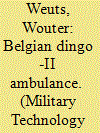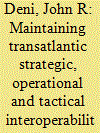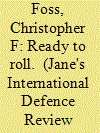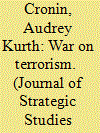| Srl | Item |
| 1 |
ID:
130130


|
|
|
|
|
| Publication |
2013.
|
| Summary/Abstract |
The article evaluates the Belgian DINGO II ambulance from Krauss-Maffei Wegmann (KMW), and discusses its capacities and medical capabilities during its use in the United Nations Interim Force in Lebanon and in the International Security Assistance Force (ISAF) in Afghanistan.
|
|
|
|
|
|
|
|
|
|
|
|
|
|
|
|
| 2 |
ID:
132045


|
|
|
|
|
| Publication |
2014.
|
| Summary/Abstract |
During the early part of the 21st century, Chinese academic circles made judgments and forecasts about US. war aims in Afghanistan and the Middle East, the possible process of the wars, and outcomes of postwar reconstruction. After the U.S.-led attack on Afghanistan on October 7, 2001, and its military invasion of Iraq on March 20, 2003, these big events were analyzed in the context of the international politics of the time. Since these two conflicts are coming to a conclusion, at least in their direct military scope, it is time to look back upon the forecasting framework to see whether alterations and improvements can be made. On December l8, 2011, all American combat troops pulled out of lraq, and the end is in sight for U.S. withdrawal from Afghanistan-either in December 20l4, or thereafter.
|
|
|
|
|
|
|
|
|
|
|
|
|
|
|
|
| 3 |
ID:
131440


|
|
|
|
|
| Publication |
2014.
|
| Summary/Abstract |
With the end of major combat operations in Afghanistan, how will the North Atlantic alliance maintain the unprecedented levels of interoperability developed over the last decade? One of the most effective means of building and maintaining interoperability-the forward-based presence of US military forces in Europe- has shrunk significantly over the last 25 years and is likely to shrink further in the coming years, meaning it will become increasingly difficult for American and European military forces to operate side by side. Nevertheless, the United States continues to look to its allies in NATO as the primary partners in maintaining and promoting common interests around the globe. Additionally, Washington seems more committed than ever to wielding force in a coalition context. In order to help remedy this seeming incongruity, Washington announced in early 2012 a plan to deploy rotationally several hundred troops from the United States to Germany for periodic exercises with European partners and allies. However, it remains unclear whether a rotational model will be sufficient to generate the level of interoperability necessary for US forces and those of its most capable European allies to work seamlessly across the range of military operations. The loss of tactical and operational interoperability threatens transatlantic strategic interoperability, and therefore risks decoupling European and American security policy. To mitigate these challenges, the article discusses several policy steps the United States should consider.
|
|
|
|
|
|
|
|
|
|
|
|
|
|
|
|
| 4 |
ID:
131726


|
|
|
|
|
| Publication |
2014.
|
| Summary/Abstract |
By the end of 2014 combat operations by foreign forces in Afghanistan will have ceased and the deployed armoured fighting vehicle (AFVs) and other equipment will be on their way home.
|
|
|
|
|
|
|
|
|
|
|
|
|
|
|
|
| 5 |
ID:
131337


|
|
|
|
|
| Publication |
2014.
|
| Summary/Abstract |
The war on al-Qaeda and its affiliates appears to be endless but every war must end. Winding down the conflicts in Afghanistan and Iraq has been difficult, but both were embedded in what was then called the 'war on terrorism.' What does 'success' in that war mean? With the death of bin Laden and the increase in drone operations, how far is the US from achieving it? Can this war end? The article analyzes the ongoing US response to the 9/11 attacks in historical context, revealing four patterns common to all prolonged wars: means become ends, tactics become strategy, boundaries are blurred, and the search for a perfect peace replaces reality. It concludes by laying out an effective strategy for ending the war.
|
|
|
|
|
|
|
|
|
|
|
|
|
|
|
|